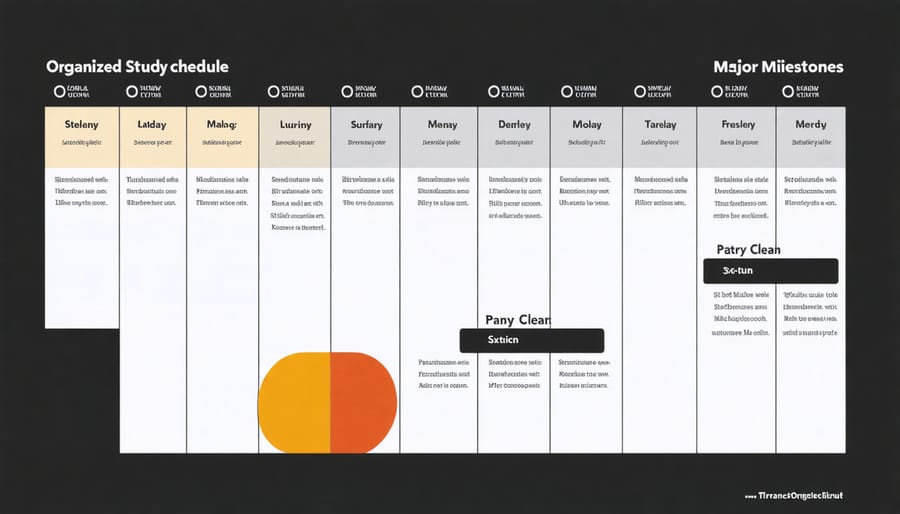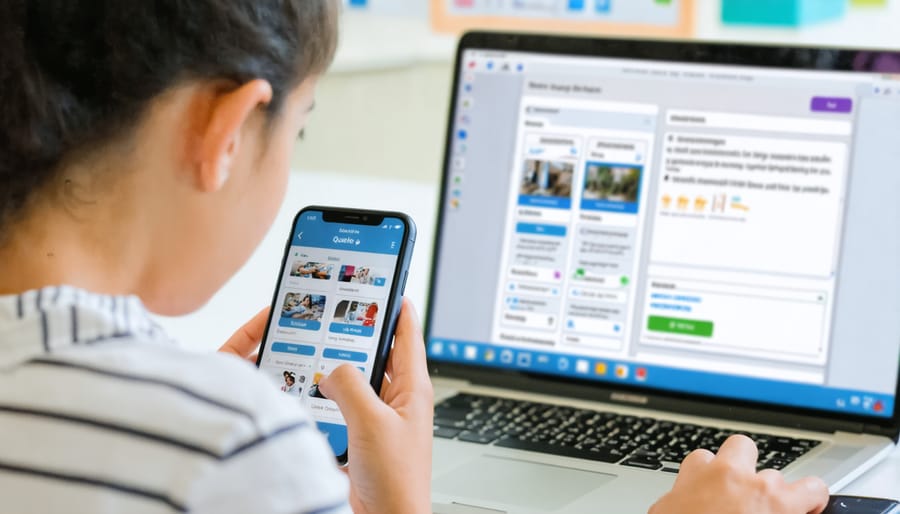
Master FBLA’s Entrepreneurship event by combining strategic Quizlet sessions with real-world business case analyses. As part of the next generation of entrepreneurs, your success hinges on mastering both theoretical knowledge and practical application.
Create custom Quizlet decks focusing on key entrepreneurial concepts: business plans, financial statements, marketing strategies, and competitive analysis. Break complex topics into bite-sized flashcards, incorporating FBLA’s official competitive event guidelines and past competition scenarios.
Structure your study routine by dedicating 30 minutes daily to active recall through Quizlet’s learn mode, followed by 30 minutes of applying these concepts to sample business cases. This dual approach bridges the gap between memorization and real-world application, essential for competition success.
Practice timed mock assessments using Quizlet’s test mode to simulate competition pressure. Focus on areas where you consistently score below 90%, and create separate decks for challenging topics. Remember, successful FBLA competitors don’t just memorize terms – they understand how to apply entrepreneurial principles in dynamic business scenarios.
Essential FBLA Entrepreneurship Concepts Every Competitor Must Know
Business Plan Fundamentals
Let’s dive into the heart of business planning – something I’ve learned is crucial for FBLA success and real-world entrepreneurship alike! Having mentored several aspiring entrepreneurs, I can’t stress enough how mastering these business learning fundamentals can make or break your competition performance.
A solid business plan always starts with a clear executive summary that hooks your audience. Think of it as your elevator pitch – concise, compelling, and impossible to ignore! Your market analysis should follow, showing you’ve done your homework on your target customers and competitors.
The financial section often trips up FBLA competitors, but here’s a pro tip: focus on realistic projections and always explain your assumptions. Include detailed revenue forecasts, startup costs, and break-even analysis. Don’t forget to outline your marketing strategy – how will you reach your customers and stand out in the market?
One common mistake I see is overlooking the operational plan. Detail your day-to-day business operations, management structure, and staffing needs. Remember to address potential risks and your mitigation strategies – this shows judges you’ve thought everything through.
Finally, make your implementation timeline specific and actionable. Break down major milestones and show how you’ll track progress. This demonstrates you’re not just dreaming – you’re ready to make it happen!

Financial Management Essentials
When preparing for the FBLA Entrepreneurship competition, mastering financial concepts is absolutely crucial. I remember feeling overwhelmed by all the calculations at first, but breaking them down into manageable chunks made all the difference!
Start by focusing on the fundamental financial ratios: current ratio, quick ratio, and debt-to-equity ratio. These are like your financial compass, helping you understand a business’s health at a glance. Make flashcards for each formula and practice calculating them until they become second nature.
Next, dive into profit margins and break-even analysis. Understanding how to calculate your break-even point is essential – it’s that sweet spot where total revenue equals total costs. Create practice scenarios and work through them step by step. I find that teaching these concepts to study partners helps cement the knowledge even better!
Don’t forget about cash flow projections and basic accounting principles. Know the difference between cash and accrual accounting, and be comfortable reading financial statements. A helpful tip: create mini-stories around financial scenarios to make them more memorable and relatable.
Finally, master ROI (Return on Investment) calculations and basic budgeting concepts. Think of ROI as your business’s report card – it tells you how well your investments are performing. Practice these calculations with real-world examples to make them stick.
Remember, it’s not just about memorizing formulas; it’s about understanding how these numbers tell a business’s story.
Smart Study Strategies That Actually Work
Creating Your Study Timeline
Creating a study timeline for your FBLA Entrepreneurship competition doesn’t have to be overwhelming! As someone who’s helped countless students prepare for competitions, I’ve found that breaking it down into manageable chunks makes all the difference.
Start by marking your competition date on a calendar and work backward. I recommend dedicating 12-16 weeks for thorough preparation. Let’s map out a schedule that works with your busy life – because we all know juggling school, activities, and competition prep isn’t easy!
For the first month, spend three 45-minute sessions per week focusing on core concepts. I love using Quizlet during this phase for building a strong foundation. Create custom study sets for different topics like business plans, marketing strategies, and financial management.
During months two and three, increase to four sessions weekly. This is when you’ll want to dive deeper into practice questions and case studies. Pro tip: Use your weekend sessions for longer, more intensive study periods, and keep weekday sessions shorter but more frequent.
The final month before competition is all about fine-tuning. Schedule daily 30-minute review sessions, mixing Quizlet flashcards with practice tests. Leave the last week for light review – trust me, cramming rarely helps!
Remember to build in buffer time for unexpected schedule changes and include regular breaks to stay fresh. I always tell my students to treat their study timeline like a business plan – be organized but flexible enough to adapt when needed.
Don’t forget to track your progress! Use a simple planner or digital app to check off completed topics and celebrate small wins along the way. This keeps you motivated and helps identify areas needing extra attention.


Practice Test Techniques
Let me share a game-changing approach to mastering your FBLA entrepreneurship content using Quizlet! As someone who’s helped countless students prepare for competitions, I’ve discovered that combining effective study methods with digital tools can make all the difference.
Start by creating custom study sets that focus on specific entrepreneurship topics. Break down complex concepts into bite-sized flashcards, and don’t forget to include real-world examples that make the information stick. I’ve found that incorporating modern learning techniques like spaced repetition and active recall through Quizlet’s various study modes can significantly boost retention.
Here’s my tried-and-true method: Begin with the “Learn” mode to familiarize yourself with the content, then progress to “Write” for active engagement. Once you’re comfortable, challenge yourself with “Match” and “Test” modes to simulate exam conditions. I recommend spending 20-30 minutes daily on focused study sessions rather than cramming for hours.
Pro tip: Create study groups within Quizlet to share sets and quiz each other. This collaborative approach not only makes learning more enjoyable but also helps identify areas where you might need extra practice. Don’t forget to utilize the audio feature for auditory learning – it’s perfect for reviewing while multitasking!
Remember to regularly test yourself using different question formats, just like you’ll encounter in the actual competition. By combining these techniques with consistent practice, you’ll build both confidence and competence in your entrepreneurship knowledge.
Competition Day Success Tips
Mental Preparation Strategies
Let’s be honest – competition nerves can affect even the most prepared FBLA entrepreneurs! I’ve mentored countless students through these competitions, and I’ve found that mental preparation is just as crucial as knowing your business concepts. Start by establishing a pre-competition ritual that helps center your thoughts. This could be as simple as five minutes of deep breathing or listening to your favorite motivational playlist.
Visualization is a powerful tool that many successful competitors use. Picture yourself confidently answering questions and maintaining composure during the competition. Try this exercise: spend 10 minutes each evening imagining yourself in the competition room, feeling calm and focused while drawing upon your knowledge.
Creating positive affirmations specific to your FBLA journey can work wonders. Instead of thinking “I hope I don’t mess up,” replace that thought with “I am well-prepared and confident in my entrepreneurship knowledge.” Remember, your mindset shapes your performance!
Time management anxiety is common, so practice with timed mock sessions. Set up study groups where you simulate competition pressure – this helps normalize the stress response and builds resilience. I always encourage my students to arrive early on competition day, allowing time to settle in and avoid last-minute rushing.
Most importantly, remember that being nervous means you care about doing well. Channel that energy into focused concentration rather than letting it overwhelm you. Stay hydrated, get enough rest the night before, and remind yourself that you’ve put in the work – now it’s time to shine!
Time Management During the Test
Time management can make or break your performance on the FBLA Entrepreneurship exam, and I’ve seen countless students transform their scores by mastering this crucial skill. Let me share some proven strategies that have helped many competitors succeed.
First, take a quick scan of the entire test when you receive it. Spend about two minutes getting a feel for the number of questions and their difficulty levels. This initial overview helps you mentally prepare and allocate your time wisely.
A practical approach I recommend is the 80-20 rule: dedicate 80% of your time to questions you’re confident about and 20% to the more challenging ones. For a typical 100-question test with 60 minutes, that’s roughly 35-40 seconds per question. Keep a small digital watch on your desk to track your pace.
Here’s my favorite time-saving tip: answer questions in two passes. During your first pass, tackle all the questions you can answer quickly and confidently. Mark the challenging questions with a small star and move on. This strategy ensures you’ve secured points from the “easy wins” before diving into tougher questions.
Remember to reserve the last 5 minutes for review. Use this time to check that you’ve answered every question and haven’t made any obvious mistakes in marking your answer sheet. It’s amazing how many points can be saved with this simple final check!
Don’t let yourself get stuck on any single question. If you’re spending more than a minute on one question, mark it and move on. You can always return to it if time permits, and this keeps you from sacrificing valuable points on easier questions later in the test.
As we wrap up our journey through FBLA entrepreneurship preparation, remember that success comes from combining various study methods and maintaining a positive mindset. Quizlet is an incredibly valuable tool, but it’s most effective when used as part of a comprehensive study strategy. Think of it as one piece of your entrepreneurial puzzle – important, but most powerful when connected with other resources and real-world applications.
I’ve seen countless students transform their competition preparation by embracing both digital tools and traditional study methods. The key is to find what works best for you while ensuring you’re covering all the essential concepts thoroughly. Whether you’re reviewing flashcards during your morning commute or participating in study groups with fellow FBLA members, consistency and dedication will help you build the confidence needed to excel.
Remember, entrepreneurship isn’t just about memorizing terms and concepts – it’s about understanding how these principles apply in the real world. As you continue your preparation, challenge yourself to think beyond the flashcards. Connect with local entrepreneurs, read success stories, and imagine how you’d apply these concepts in your own future business ventures.
Stay motivated, trust in your preparation, and know that every minute you spend studying brings you closer to your goals. The entrepreneurship competition is your opportunity to showcase not just what you’ve memorized, but how well you understand the spirit of entrepreneurship. You’ve got this!



